AdsPower LocalAPI MCP Server: Smarter Browser Automation with AI
Take a Quick Look
Learn how the AdsPower Local API MCP Server empowers AI tools like Claude to open, close, and create browser profiles effortlessly. Try it now to experience next-level automation.
Artificial intelligence is rapidly transforming the way we work with automation tools. Imagine giving a simple command to your AI assistant like "Create three browser profiles with random fingerprints and open them now" — and watching it happen instantly. That's exactly what the new AdsPower LocalAPI MCP Server makes possible.
This powerful integration connects AdsPower's browser automation capabilities with AI models through the Model Context Protocol (MCP) — allowing tools like Claude Desktop to directly start, close, and manage browser profiles via natural language.
What Is MCP and Why It Matters
MCP (Model Context Protocol) is an open-source standard that connects AI models to external systems like browsers, databases, and APIs.
Think of MCP as a USB-C port for AI — a universal connection that lets tools like Claude interact directly with AdsPower. It transforms AI from a passive chatbot into an intelligent agent capable of real actions: launching browsers, updating fingerprints, or managing multiple online identities.
For developers, MCP simplifies integration. For AI tools, it expands the capability. For users, it means one thing — real automation made conversational.
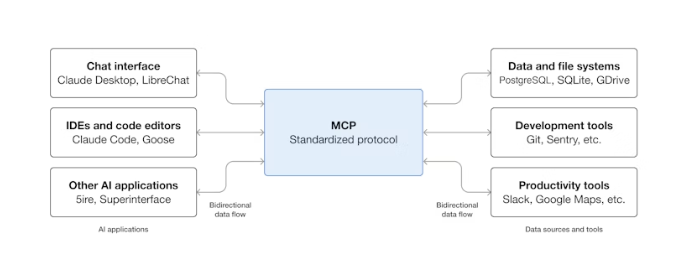
Introducing AdsPower Local API + MCP Server
The AdsPower Local API MCP Server is a multi-functional control platform that lets AI communicate with AdsPower's LocalAPI. Built with TypeScript, Playwright, and NPM, it allows natural language access to browser automation tasks — with no scripting required.
With it, AI models can:
- 🧩 Create new browser profiles
- 🚀 Start and stop browser profiles
- 🔄 Update browser fingerprint configurations
- 🕵️ Automate web tasks like data scraping, login simulation, or content testing
- More...
This integration helps both technical and non-technical users manage browser automation workflows more efficiently.
Technology Stack
- Playwright – Cross-browser automation framework supporting Chrome, Firefox, and Safari
- TypeScript – Ensures reliability and maintainability
- NPM Modularization – Simple installation and fast setup
How to Set Up the MCP Server
You can connect AdsPower's MCP Server with Claude Desktop, Cursor, or other MCP-compatible tools. Here, Claude is taken as an example.
Requirements
- AdsPower installed and running locally
- Node.js version 18 or higher
- Claude Desktop installed
Configuration Guide for Claude Desktop
a. Open Claude and go to File > Settings > Developer > Edit Config to edit the configuration file.
Generally, the .json file is saved in the following path:
- On macOS: ~/Library/Application Support/Claude/claude_desktop_config.json
- On Windows: %APPDATA%/Claude/claude_desktop_config.json
b. Then open the .json file and add the following info to the file:
For macOS / Linux
{
"mcpServers": {
"adspower-local-api": {
"command": "npx",
"args": ["-y", "local-api-mcp-typescript"]
}
}
}For Windows
{
"mcpServers": {
"adspower-local-api": {
"command": "cmd",
"args": ["/c", "npx", "-y", "local-api-mcp-typescript"]
}
}
}c. Save the file and restart Claude Desktop.
![]()
d. Move to File > Settings > Connectors to check whether Claude has connected to the AdsPower API successfully.
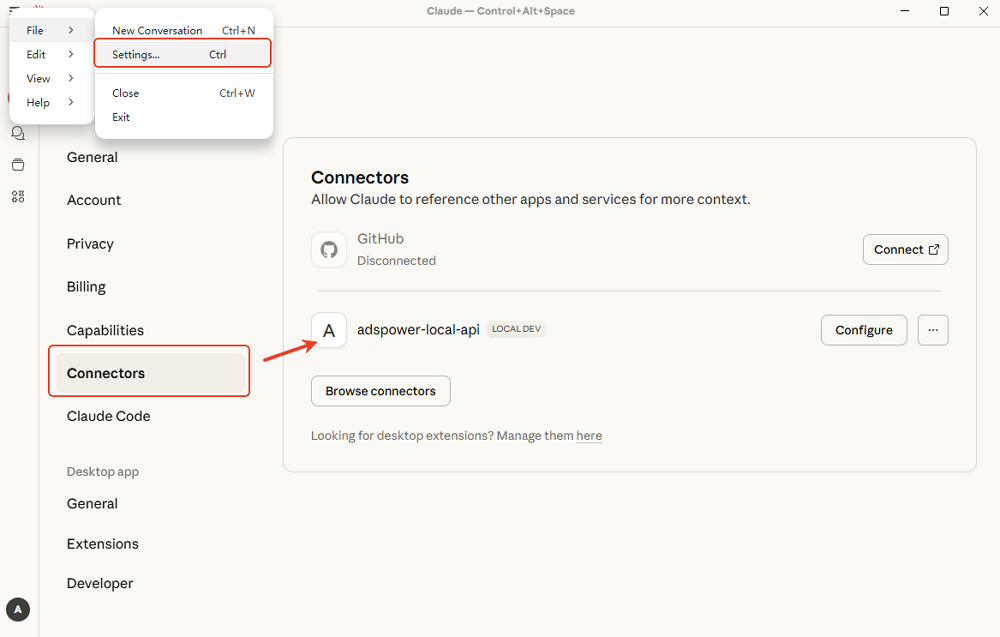
When you click Configure, you can check all the tools available for use via Claude.
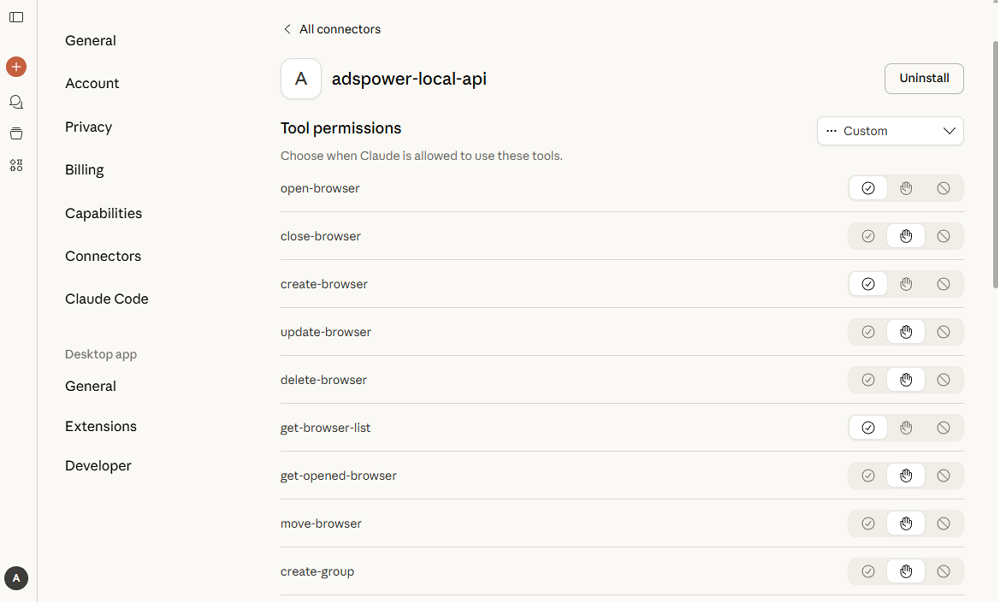
e. Let AdsPower browser automatically work by inputting a prompt in Claude.
Note: While operating, please make sure AdsPower is launched on your computer and disable "API verification". However, you need to confirm that the profile is trusted before disabling it to avoid being maliciously accessed by other programs.
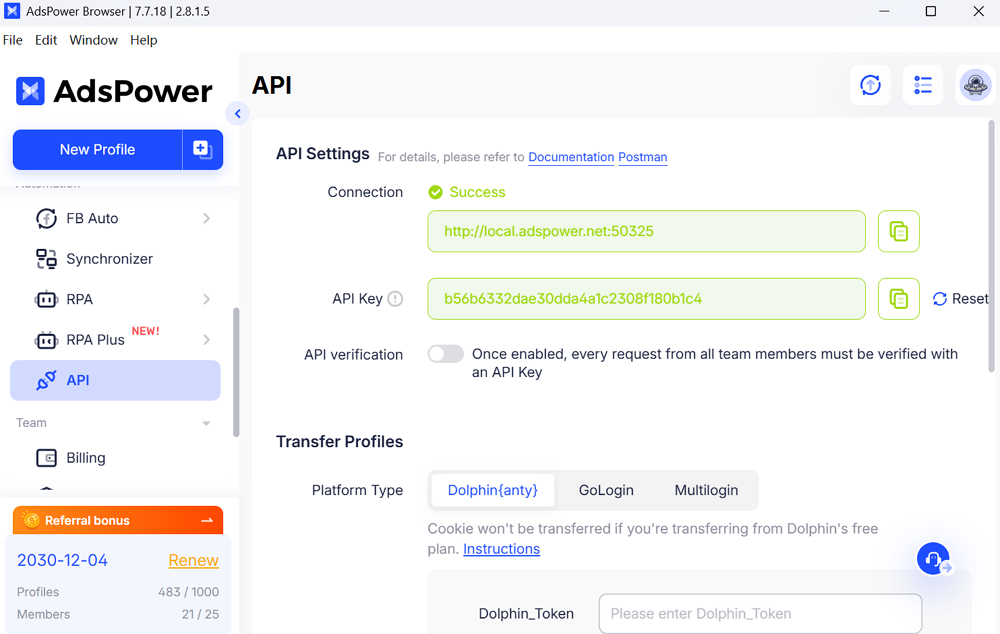
You can now directly give commands in Claude and have it help automatically execute tasks. Let's explore the usually-used cases.
Example 1: Open a Browser Profile
To demonstrate opening a browser profile in Claude, type:
Open a browser profile ID: xxxx (enter the ideal profile NO.) and visit google.com in AdsPower
Claude will connect to AdsPower's LocalAPI and execute the /api/v1/browser/start command to launch that specific browser profile and open Google automatically.
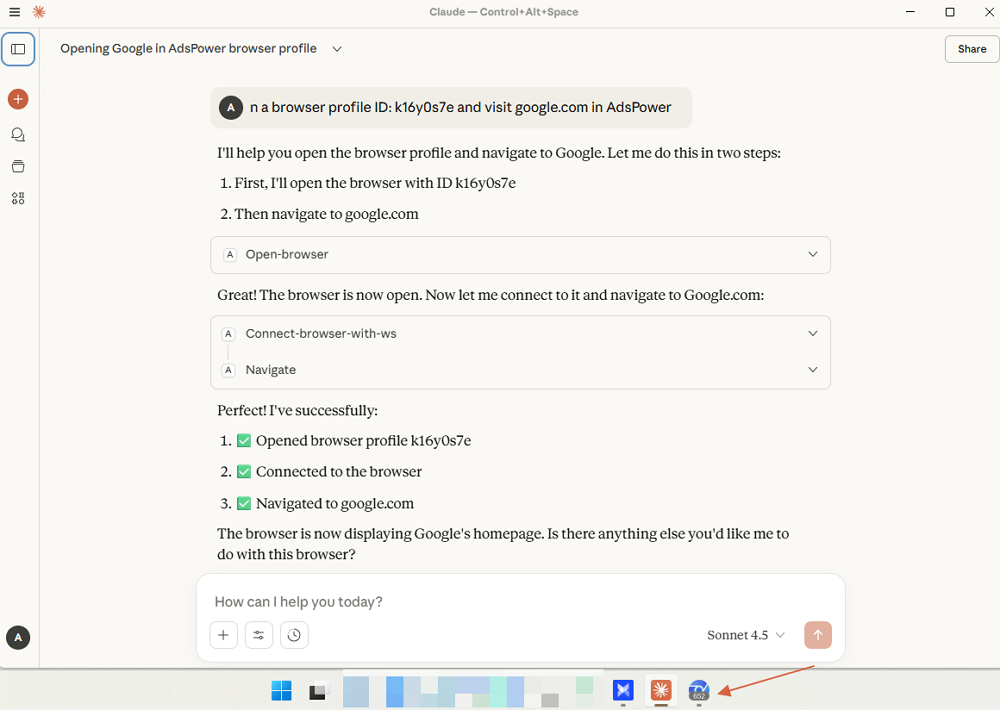
Example 2: Close a Browser Profile
To stop all running browsers, simply type:
Close all running AdsPower browser profiles.
Claude will issue the /api/v1/browser/stop command to safely close active sessions.
Example 3: Create a Browser Profile
To demonstrate how to automatically create a browser profile, enter:
Create an Android UA browser using Chrome 134, and open the profile.
Note: Before running this command, please ensure that the corresponding browser kernel version (Chrome 134) is installed.
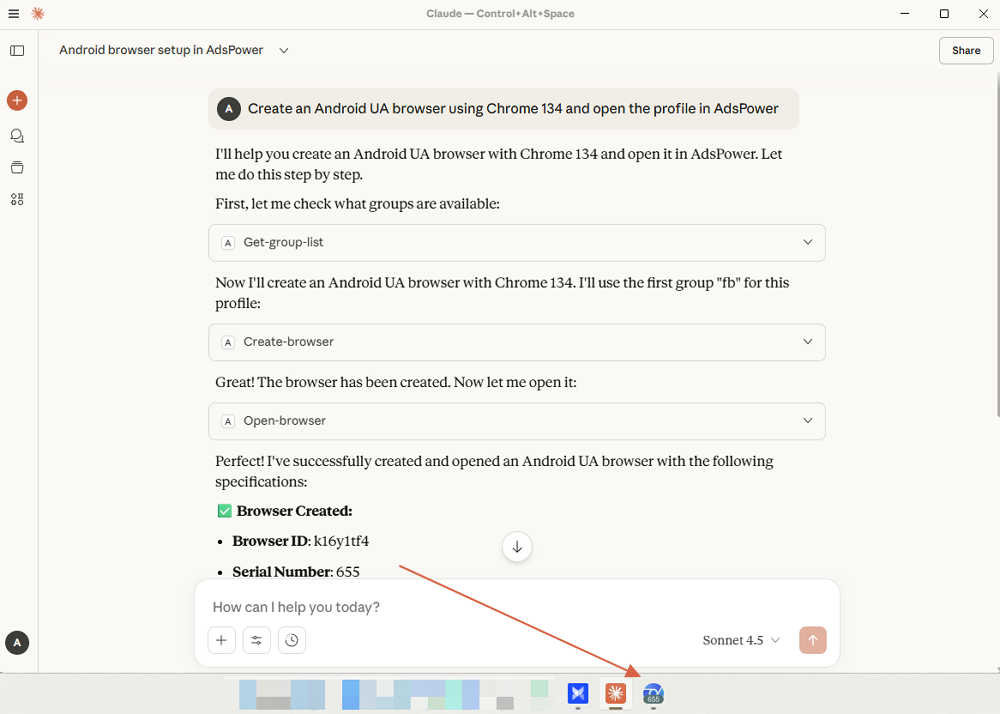
Claude will create a new profile with an Android user agent and start the browser automatically, leveraging AdsPower's API endpoints.
![]()
When to Use This Integration
This integration is perfect for:
- Users who automate workflows with AI assistants like Claude
- Marketers managing multiple browser identities for campaigns
- Developers testing multi-account scenarios
- Researchers scraping or analyzing web data safely
With this setup, you can ask Claude to "open three browser profiles with random fingerprints" or "delete a profile", "move browser profile to a certain group" — all executed automatically through AdsPower.
Why It Matters
By combining AdsPower browser with MCP's universal AI connectivity, this integration brings a new level of flexibility to automation.
Developers save time writing scripts, and end users gain conversational access to advanced features — a perfect blend of AI intelligence and browser control.
The result: streamlined workflows, faster testing, and truly hands-free browser automation.
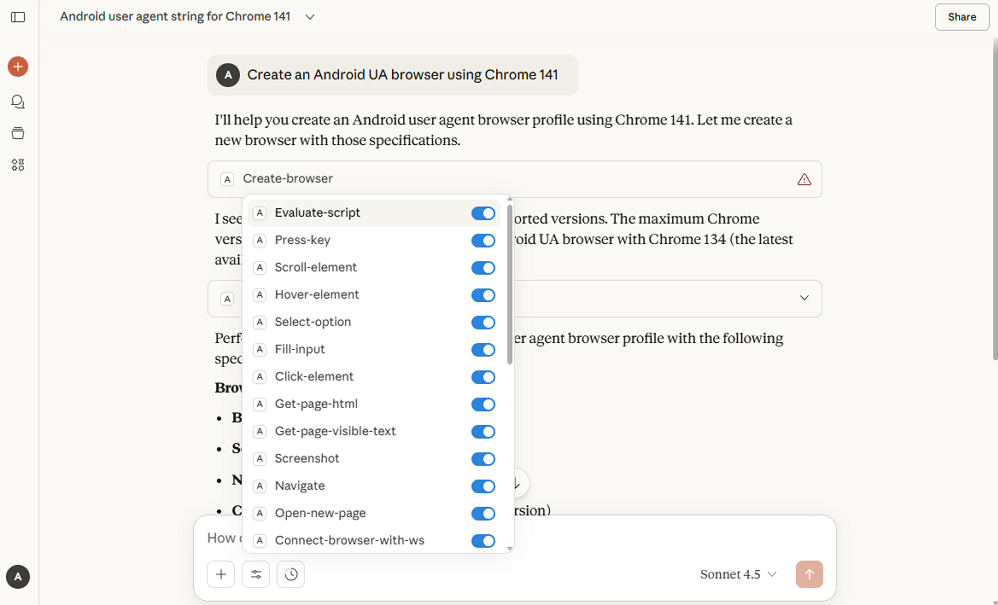
Final Thoughts
The AdsPower MCP Server redefines how users interact with browser automation. Instead of manually launching profiles or writing scripts, you can now let AI handle it all — from creation to control.
Whether you're running ad campaigns, managing multiple eCommerce stores, or testing automation flows, this integration provides a smarter, faster, and more intuitive way to manage browser profiles.
👉 Try the AdsPower LocalAPI MCP Server today:
👉 Learn more:
https://github.com/AdsPower/local-api-mcp-typescript
Experience the next generation of AI-powered browser profile management — built for simplicity, flexibility, and innovation.

People Also Read
- What's New in AdsPower Browser in January 2026
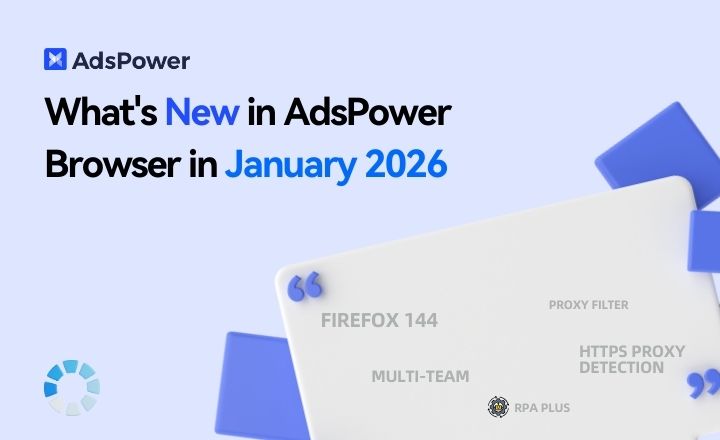
What's New in AdsPower Browser in January 2026
Discover what's new in AdsPower Browser January 2026: Firefox 144 kernel, multi-team support, improved proxy checks, and automation upgrades. Update n
- Join AdsPower RPA Creator Program to Earn with Your Scripts
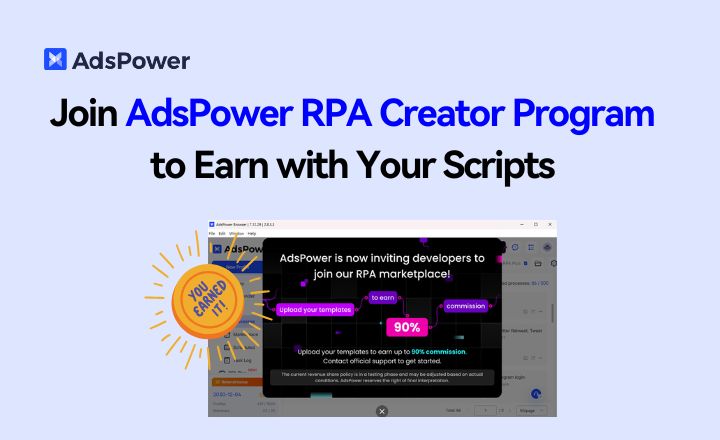
Join AdsPower RPA Creator Program to Earn with Your Scripts
Upload your RPA templates to the AdsPower marketplace. Earn up to 90% commission and share your automation expertise. Start monetizing your scripts
- What's New to AdsPower in December 2025
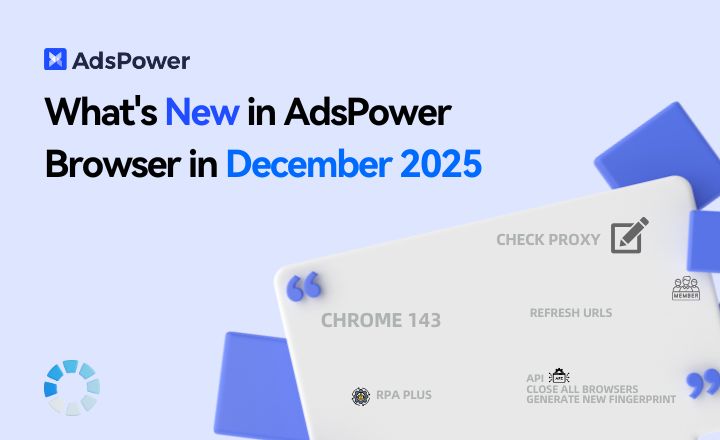
What's New to AdsPower in December 2025
AdsPower December update introduces Chrome 143, RPA Plus automation upgrades, proxy improvements, team management updates, and new APIs
- AdsPower 2025 Year in Review: Security, Scale, and Sustainable Growth
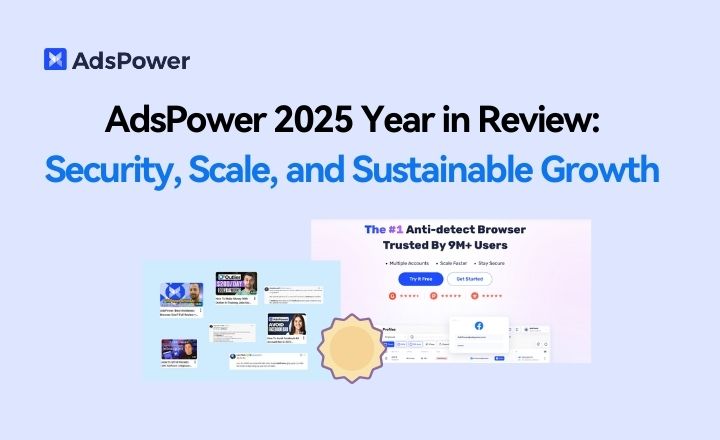
AdsPower 2025 Year in Review: Security, Scale, and Sustainable Growth
AdsPower's 2025 Year in Review covers security, 9M+ users, 2.2B+ browser profiles, automation upgrades, and what's next for global teams.
- AdsPower RPA Plus Is Live: A Smarter Way to Build, Run, and Scale Automation
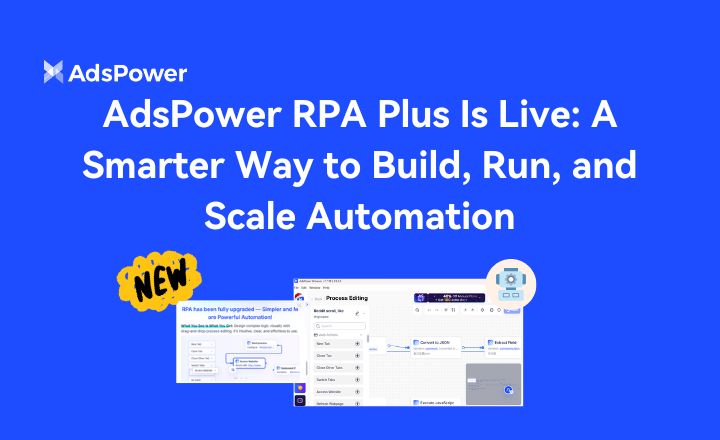
AdsPower RPA Plus Is Live: A Smarter Way to Build, Run, and Scale Automation
AdsPower introduces RPA Plus with task management, improved debugging, reusable workflows, and clearer run records for teams running automation


